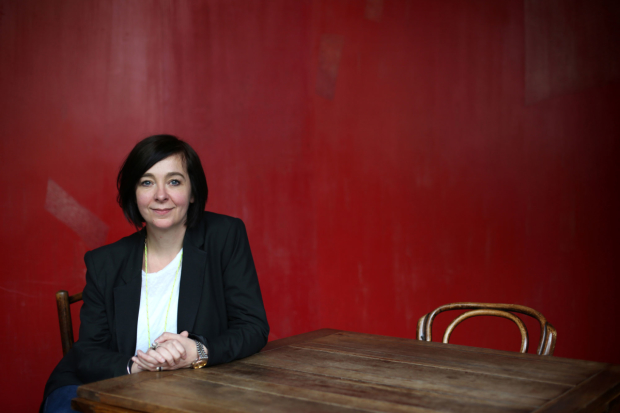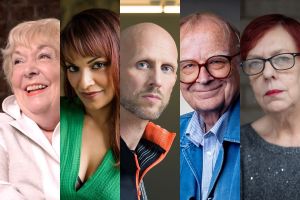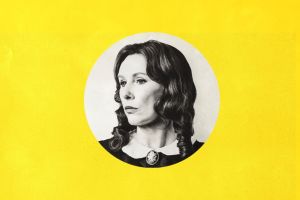Vicky Featherstone: Theatre needs to be democratic
As the Royal Court turns 60, the theatre’s artistic director talks about her vision for its future, playwrights vs ‘theatremakers’ and how theatre needs to be truly democratic

© Rosie Hallam
Vicky Featherstone uses the word extraordinary an awful lot during our interview. But, to be fair, it's hard to think of a more appropriate word when you are talking about the Royal Court. Turning 60 this year, the theatre has been at the forefront of contemporary drama in Britain, and the world, throughout those six decades. Look Back In Anger, Saved, Blasted, Krapp's Last Tape, The Rocky Horror Show and many more began on the boards in Sloane Square. And these days you continue to find some of the most dynamic new plays from across the world on its stages. This year alone, under Featherstone's artistic directorship, we've seen Alistair McDowall's astonishing sci-fi play X, a new piece from Caryl Churchill, the Bruntwood Prize-winning Yen, by Anna Jordan. The list continues.
"That's the thing that I think is most extraordinary," says Featherstone when I chat to her in her office upstairs at the Court. "This theatre has survived for 60 years, continuously pushing at the edge. The fact that you are here and still interested in what we are doing. That's a miracle."
'People thought theatremakers were cooler but I think playwrights are extraordinary'
The 49 year-old Featherstone began running the building in 2013. The venue's first woman artistic director, she came from the National Theatre of Scotland and before that new writing company Paines Plough. She arrived with a vast back catalogue of challenging, successful productions, and an impressive list of collaborations with writers such as Abi Morgan, Zinnie Harris, Dennis Kelly and Douglas Maxwell. What with her "obsession", as she calls it, with new writers, she seems an incredibly good fit for the venue.
But Featherstone is keen to downplay her impact on the Court. Throughout our interview, she deflects from her achievements modestly. It's the writers, she says again and again, that make the Court. "You must never feel it's yours, or personality driven," she explains. "You can only be here if you believe the building is more important than you are.
"Somewhere like the Almeida can be brilliantly personality driven by Rupert Goold, but the Royal Court can only take a little bit of the value of the current artistic director."
While that is true up to a point, there's no denying that Featherstone has made her own mark. She opened her first season three years back in a flurry of activity with the Open Court Festival, where she allowed the writers to take over the running of the building. The festival was a 'pragmatic' decision, she says, but it was also a reaction to the fact that, at the time, she felt people were "being a bit dismissive of the playwright." "People thought theatremakers were cooler, and although I love that kind of work, I wanted to go — actually I think playwrights are extraordinary," she says.
Open Court was a bold first move and is a clear example of the way Featherstone works: she's inclusive, enabling and collaborative. And while she's not scored a raft of out-and-out hits at the venue, her programming is brave and very exciting. McDowell's X is a case in point, the play broke down dramatic forms on the main stage – it included a whole section where one character just repeated the letter 'X'. Even she wasn't sure that section would make it into the final cut: "As we started rehearsing I thought: 'Oh my god Ali [McDowall] has actually written a play where these Xs work'," she says with a genuine astonishment. "That was really humbling for me. Writers are so surprising." Her risk-embracing programming continues with the latest production – Anthony Neilson's Unreachable – which has been created in rehearsals and, according to recent accounts, seems to be changing fairly drastically day by day ahead of opening night.
'You can only be here if you believe the building is more important than you are.'
Featherstone was galvanised at university by the writers she discovered – "Brecht, Beckett, Churchill, Bond, all the play texts had Royal Court on the front. The Royal Court is what theatre really means to me." Ask her what that is exactly and she cites a book she read whilst studying by playwright John McGrath. It sets out that theatre shouldn't just be about an educated elite. "It should be about an ownership of a story and the voices on stage should be those that people can relate to," she says, "That's what the Royal Court has always been [about]."
It's that passionate desire for theatre to be representative of all accessible to all that really seems to drive Featherstone. It's there when she mentions her long-term friend and collaborator John Tiffany, whose recent project is the behemoth Harry Potter and the Cursed Child. (Featherstone saw it at the dress rehearsal and she can confirm that we are in for a treat). "It's truly theatrical," she says."I love the idea that everyone will be getting a chance to play Harry Potter and Hermione [when the script is released]."
Making sure the Court represents and reaches a diverse London audience is key for her going forward. "All you ever really want is that audiences are genuinely reflecting the communities in which we live. It would be amazing if in a few years what we had on was truly representative of a London audience." Elsewhere she'll be focusing on international work, on touring and on the newly revamped educational department. And for the moment she's not announced her next directing project. "I have to do my day job and let other people have a go," she says. "I am having a sensible mini break."
Watch videos from actors, playwrights and directors on the Royal Court's Sixty Years New site. Unreachable, starring Matt Smith runs at the Royal Court until 6 August.












